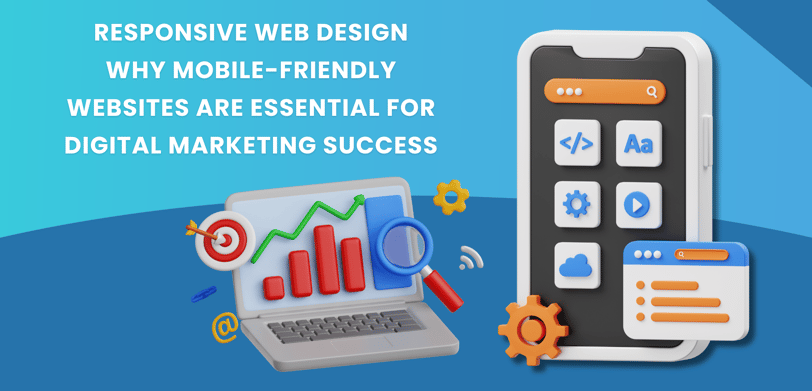
Responsive Web Design Why Mobile-Friendly Websites are Essential for Digital Marketing Success
Discover why responsive web design is essential for digital marketing success in our latest blog post. Explore the benefits of mobile-friendly websites, including improved user experience, enhanced SEO performance, and increased conversion rates. Stay ahead of the curve and ensure your online presence remains competitive in today's mobile-first world


In today's mobile-first world, having a responsive website is no longer optional—it's essential for digital marketing success. With the majority of internet users accessing the web via mobile devices, businesses must prioritize mobile-friendly design to provide optimal user experiences and stay competitive in the online marketplace. In this blog post, we'll explore the importance of responsive web design and why mobile-friendly websites are vital for driving digital marketing success.
Adaptability Across Devices: Responsive web design ensures that your website adapts seamlessly to various screen sizes and devices, including smartphones, tablets, laptops, and desktops. By using flexible layouts, fluid grids, and media queries, responsive websites adjust their content and design elements dynamically based on the device's screen size, orientation, and resolution. This adaptability ensures a consistent and optimized user experience across all devices, eliminating the need for separate mobile and desktop versions of your website.
Improved User Experience: Mobile-friendly websites provide a superior user experience for visitors accessing your site on smartphones and tablets. Responsive design prioritizes usability and accessibility, with features such as easy navigation, readable text, and touch-friendly buttons and links. By optimizing the user experience for mobile users, businesses can reduce bounce rates, increase engagement, and encourage conversions, ultimately driving digital marketing success.
Enhanced SEO Performance: Responsive web design is crucial for search engine optimization (SEO), as search engines like Google prioritize mobile-friendly websites in their search results. Google's mobile-first indexing means that the mobile version of your website is used as the primary source for indexing and ranking purposes. By ensuring your website is responsive and mobile-friendly, you can improve your search engine rankings, increase visibility, and attract more organic traffic to your site.
Increased Conversion Rates: A responsive website can have a significant impact on conversion rates and sales. Mobile-friendly design eliminates barriers to conversion by providing a seamless and intuitive browsing experience for mobile users. Whether it's making a purchase, filling out a form, or contacting your business, responsive design makes it easier for visitors to take action on your website, leading to higher conversion rates and improved ROI for your digital marketing efforts.
Adaptation to Consumer Behavior: The shift towards mobile usage is driven by changes in consumer behavior and preferences. Today's consumers expect instant access to information and seamless browsing experiences across all devices. A responsive website enables businesses to meet these expectations and adapt to evolving consumer behavior, ensuring that they remain relevant and competitive in an increasingly mobile-centric marketplace.
Future-Proofing Your Business: Investing in responsive web design is not just about meeting current needs—it's also about future-proofing your business for the long term. With mobile usage continuing to rise and new devices and screen sizes constantly emerging, responsive design ensures that your website remains adaptable and accessible to users, regardless of how technology evolves in the future.
In conclusion, responsive web design is a cornerstone of digital marketing success in today's mobile-driven world. By prioritizing mobile-friendly design, businesses can provide superior user experiences, improve SEO performance, increase conversion rates, and future-proof their online presence. Embrace responsive design as a strategic investment in your digital marketing strategy and ensure that your website remains competitive, relevant, and accessible to users across all devices.
